Understanding the Intersection of Self-Trust and Independence in Sobriety
Recovery from substance addiction is a multifaceted journey that encompasses emotional, physical, social, and mental growth. Central to this process is the development of emotional self-trust, a vital component that fosters independence and resilience. This article explores how nurturing emotional self-trust can lead to sustainable sobriety, emphasizing key strategies, research insights, and holistic practices that support individuals in reclaiming their autonomy and building a fulfilling life free from substances.
The Importance of Independence in Addiction Recovery
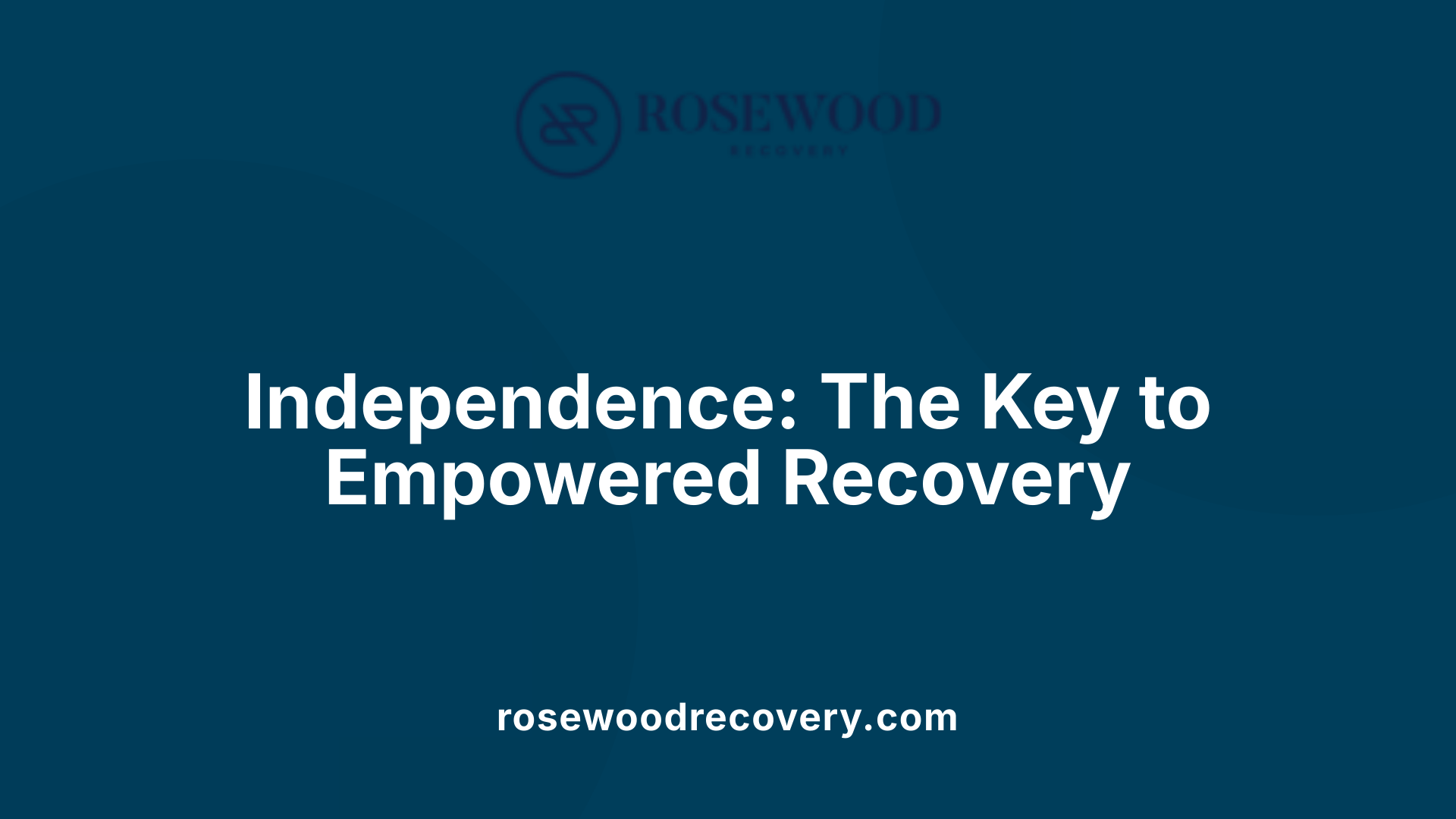
How does independence influence success in addiction recovery?
Independence is a cornerstone of effective recovery from addiction. It empowers individuals to take charge of their journey, making choices that align with their personal values and goals. When individuals develop independence, they learn vital skills such as managing their finances, making informed decisions, and regulating their emotions.
Feeling capable and self-reliant helps boost motivation and a sense of purpose, which are crucial for sustained sobriety. It allows individuals to reconnect with their identity beyond addiction, fostering a stronger self-esteem and confidence. As they become more independent, they are better equipped to handle challenges and stressors without resorting to substances.
Building independence also enhances resilience against triggers. Instead of relying on external support alone, individuals cultivate healthy coping mechanisms, such as mindfulness, physical activity, or seeking social support, to navigate life's obstacles.
In essence, independence supports long-term recovery by cultivating responsibility, boosting confidence, and encouraging a proactive approach to maintaining sobriety. It promotes psychological well-being and helps prevent relapse, ensuring that individuals can sustain their new, substance-free lives.
How does independence foster responsibility and accountability?
Taking responsibility for one's recovery journey is essential. Independence instills a sense of ownership over personal growth and health. When individuals are responsible for their daily choices, they become more accountable for their actions and reflections.
This sense of responsibility often leads to engaging in positive habits, such as attending support groups regularly, maintaining healthy routines, and setting future goals. Accountability, in turn, encourages honesty about struggles and progress, which is vital in recovery.
Furthermore, managing one's life independently means setting boundaries, recognizing toxic relationships, and cultivating supportive environments. These actions contribute to a stable foundation for sobriety.
Overall, fostering independence builds a mindset of ownership—an understanding that recovery is a personal endeavor requiring ongoing effort, responsibility, and commitment.
What is the impact of independence on self-confidence and self-esteem?
Building independence significantly impacts self-confidence and self-esteem. As individuals develop the ability to manage their own lives, they begin to see themselves as capable and resilient.
This enhanced self-belief reinforces the idea that a fulfilling life exists beyond substance use. It encourages proactive engagement in recovery activities, nurturing a positive self-image.
Also, practicing independence often involves learning from setbacks, celebrating milestones, and recognizing personal strengths. These experiences bolster confidence and foster a sense of accomplishment.
Self-love is integral to this process—learning to forgive oneself and embrace the recovery journey enhances self-esteem. Strong self-confidence and self-esteem make individuals more likely to seek support when needed, advocate for themselves, and maintain long-term sobriety.
In summary, independence acts as a foundation for cultivating a resilient, positive self-relationship, which is essential for sustained recovery.
Building Emotional Self-Trust as a Foundation for Independence
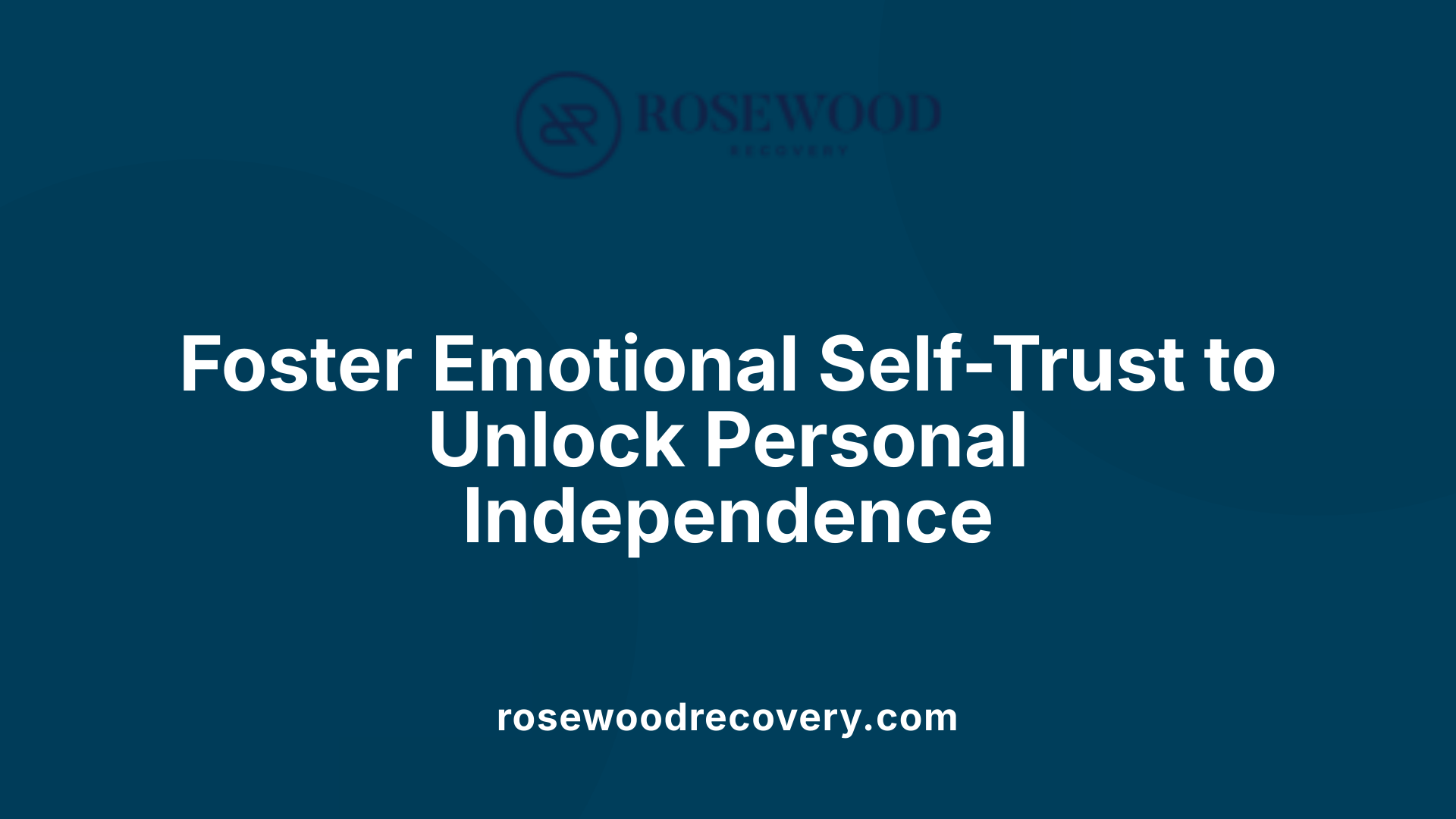
What strategies can help build emotional self-trust to support recovery?
Developing emotional self-trust is essential for maintaining independence in recovery. It involves creating a solid foundation of confidence in one’s ability to manage emotions and challenges without reliance on substances or external validation. Several practical strategies can support this journey.
First, cultivating self-compassion plays a vital role. Practices such as self-forgiveness, accepting compliments sincerely, and engaging in prosocial activities that enhance self-esteem help individuals feel more secure in their emotional state. When people treat themselves with kindness and understanding, they foster a positive inner dialogue that underpins resilience.
Another critical aspect is incorporating consistent self-care routines. Regular physical activity, balanced nutrition, and mindfulness meditation can stabilize mood and increase emotional resilience. These habits contribute to a sense of being in control and promote overall well-being.
Therapy, particularly approaches like cognitive-behavioral therapy (CBT), helps individuals challenge negative thoughts and develop healthy emotional responses. By increasing self-awareness, these techniques make it easier to trust oneself even during difficult moments.
Building a strong support network is also crucial. Connecting with friends, family, or recovery groups provides encouragement, accountability, and validation, reinforcing emotional stability. Sharing experiences reduces feelings of isolation and fosters community support.
Setting achievable goals, celebrating small successes, and viewing setbacks as opportunities for growth further strengthen emotional confidence. This mindset promotes resilience and helps maintain momentum toward independence.
Overall, fostering emotional self-trust through these strategies allows individuals to rely on their inner strength. This trust diminishes the need for external approval, empowering sustained recovery and a more fulfilling, self-directed life.
The Science Behind Emotional Self-Trust and Recovery Outcomes
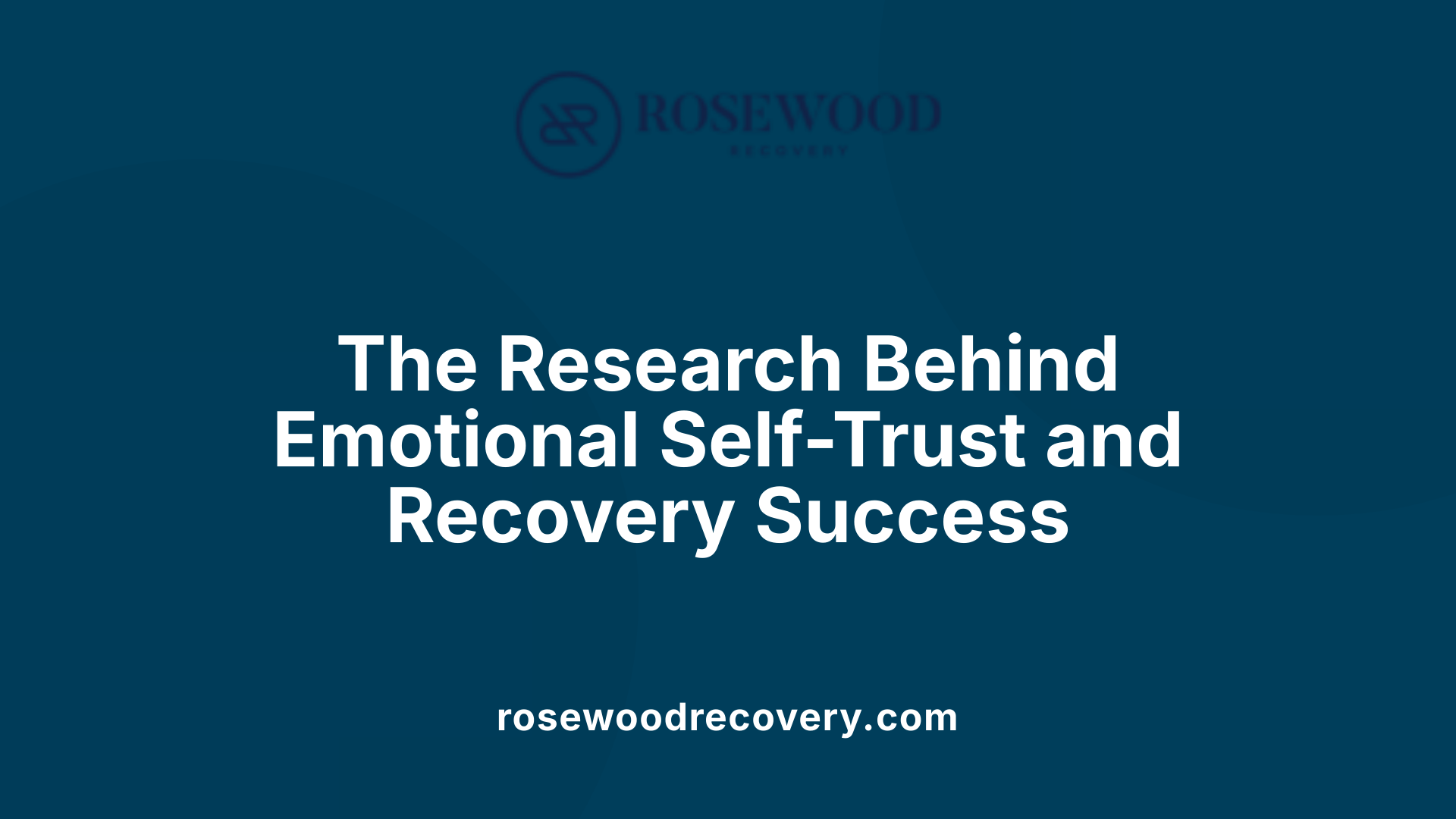
What research supports the role of emotional self-trust in supporting independence during recovery?
Research indicates that emotional self-trust plays a pivotal role in fostering independence among individuals in recovery. Central to this is the idea that qualities like hope—characterized by goal-setting, perseverance, and planning—enhance resilience and autonomous decision-making. Studies show that individuals with high levels of hope are better equipped to manage setbacks and stay committed to their recovery journey.
Self-esteem, especially facets such as self-competency and self-liking, also bolster confidence in one’s abilities. Elevated self-esteem is linked to improved impulse control and the capacity to handle stress without resorting to substances. Participants in recovery programs like Alcoholics Anonymous often report that strengthened social bonds and self-efficacy, or belief in their ability to succeed, are key factors in maintaining sobriety.
Psychological interventions that aim to build emotional self-trust typically include techniques such as challenging negative self-perceptions and cultivating positive coping strategies. These approaches help individuals develop healthier emotional regulation skills, including managing negative thoughts and emotions effectively. Research demonstrates that such therapeutic practices can significantly improve long-term outcomes by reinforcing confidence and independence.
In sum, fostering emotional self-trust through cultivating hope, boosting self-esteem, and strengthening supportive relationships is fundamental for empowering individuals to manage their recovery autonomously. This comprehensive approach helps sustain sobriety, encourages responsibility, and promotes emotional well-being, crucial cornerstone elements for lasting independence.
The Role of Emotional Self-Trust in Facilitating Sustainable Sobriety
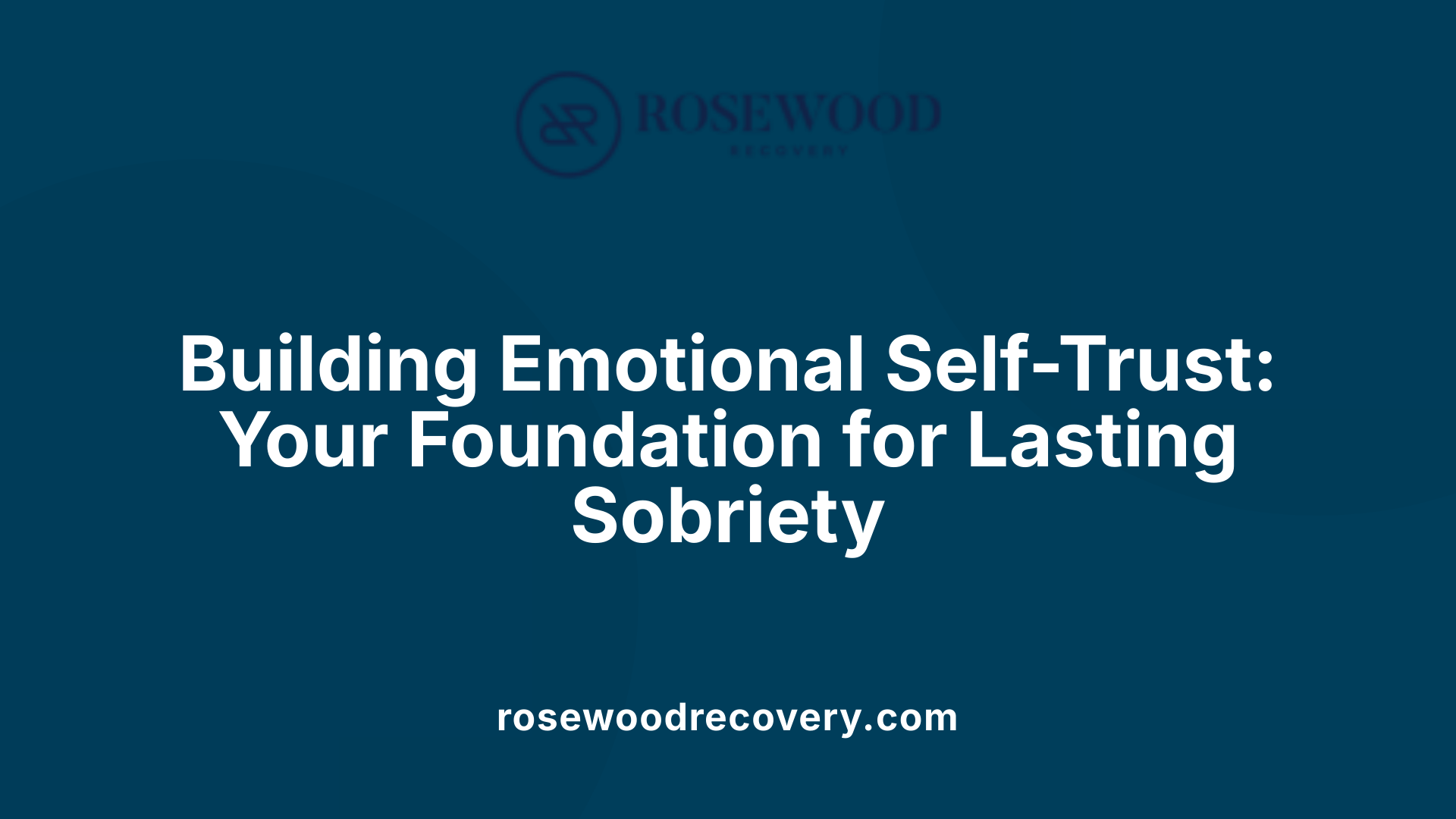
How does emotional self-trust support independence in sobriety?
Emotional self-trust is a fundamental aspect of maintaining independence during recovery from substance use. It involves believing in one's ability to understand, manage, and respond to emotional experiences effectively. When individuals develop this trust, they become better equipped to handle triggers and stressors without reverting to substance use.
Building emotional self-trust encourages resilient coping strategies. For instance, instead of reacting impulsively to negative feelings, a person confident in their emotional regulation skills can pause, assess, and choose healthier responses like mindfulness, exercise, or talking to a support person.
Furthermore, emotional self-trust fosters a sense of autonomy and self-efficacy. Individuals feel empowered to take control of their emotional landscape, reducing dependency on external validation or substances as a means of emotional relief. This internal management nurtures independence, reinforcing their capacity to lead a fulfilling, sober life.
Maintaining emotional self-trust also promotes self-compassion. Recognizing that setbacks are part of the recovery process helps individuals to recover from slips without self-blame, reigniting their motivation and commitment. As a result, emotional self-trust not only supports resilience but also encourages continuous personal growth.
Research highlights that developing emotional regulation skills, such as mindfulness and distraction techniques, enhances emotional self-trust. These skills serve as tools for navigating complex feelings, thereby reducing the risk of relapse. When recovery strategies are rooted in self-trust, individuals more readily overcome setbacks and sustain their independence in sobriety.
In summary, emotional self-trust acts as a cornerstone for resilience, healthy emotional regulation, and overcoming challenges, ultimately underpinning sustainable sobriety and personal autonomy.
Integrating Self-Care, Support Networks, and Personal Growth for Lasting Sobriety
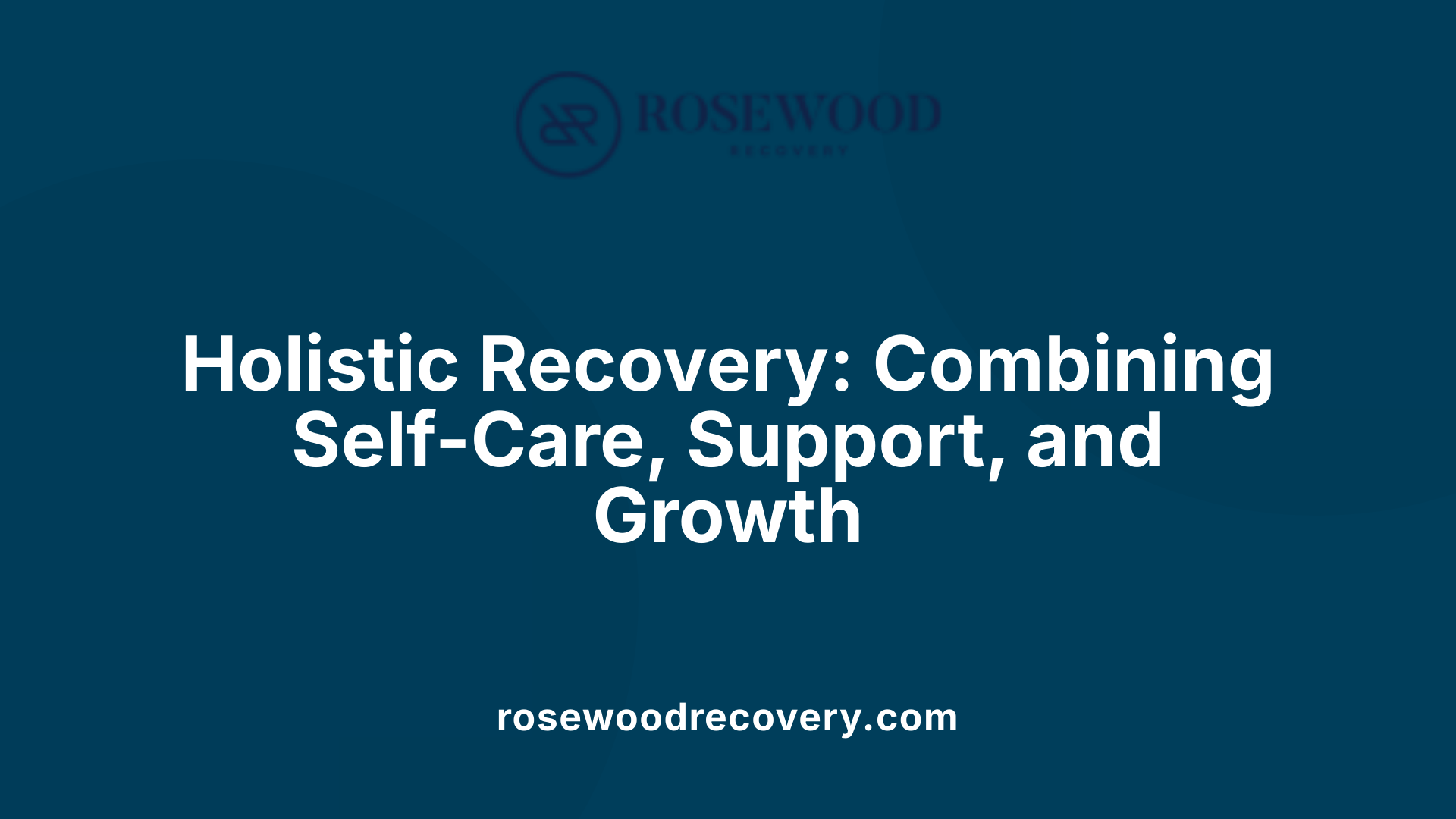
How does a comprehensive approach, including self-care, relationships, and personal development, support long-term recovery?
A holistic recovery plan embraces various facets of well-being, recognizing that recovery is not just about abstaining from substances but also about rebuilding a healthy, balanced life. Self-care activities such as exercise, mindfulness, and engaging in hobbies are crucial for emotional stability and mental health. These routines nurture both the body and mind, helping individuals restore self-worth and strengthen their self-love.
Building healthy relationships is another vital component. Support from family, friends, or recovery groups provides ongoing encouragement and accountability. Establishing boundaries and fostering open communication with loved ones helps rebuild trust and creates a foundation of mutual support.
Personal development through therapy, community involvement, and exploring new life roles boosts confidence and reinforces independence. By focusing on strengths and resilience, individuals can develop a sense of purpose and autonomy, essential for maintaining sobriety.
What role do support groups and community connection play in sustaining sobriety?
Support groups like 12-step programs and group therapy offer more than just community; they foster a sense of belonging and shared experience. These groups serve as a safe space for discussing challenges, celebrating successes, and gaining encouragement. They help prevent feelings of isolation, which can otherwise trigger relapse.
Making connections within these groups promotes accountability and provides ongoing motivation. They also offer access to mentors and peers who understand the journey of recovery, helping individuals navigate the emotional and social aspects of sobriety.
Strong community ties can extend beyond formal groups. Maintaining relationships with supportive friends and family creates a network of trust and reassurance. These relationships are vital for emotional health, providing the stability needed during difficult times.
How can individuals maintain motivation and adapt to change over time?
Recovery is a continuous process involving periods of growth, setbacks, and adaptation. Staying motivated requires ongoing commitment to personal goals, such as maintaining healthy routines and engaging in self-reflection.
Practicing flexibility is important. As circumstances change—whether life events, health issues, or emotional challenges—being adaptable helps individuals find new strategies and support systems that work for them.
Consistently revisiting recovery goals and celebrating milestones can reinforce motivation. Embracing new activities, pursuing education or career opportunities, and seeking ongoing personal development foster resilience and a positive outlook.
Maintaining hope and belief in a better future is foundational. With persistent effort, reliance on support networks, and a focus on holistic wellness, individuals can sustain their independence and enjoy a fulfilling life after addiction.
Empowering Long-Term Sobriety Through Emotional Self-Trust
Ultimately, developing emotional self-trust is essential for fostering independence in sobriety. It empowers individuals to navigate the emotional landscape of recovery with confidence, resilience, and self-awareness. By cultivating self-compassion, engaging in holistic self-care, and building supportive relationships, those in recovery can sustain their independence and achieve lasting change. Emotional self-trust not only helps prevent relapse but also nurtures a positive, self-reliant identity—paving the way for a life of purpose, wellbeing, and fulfillment.
References
- The Importance of Independence in Recovery
- Nurturing Self-Care and Self-Esteem in Substance Abuse Recovery
- How to Manage Emotions in Sobriety | Recovery and Sober Living
- Building and Managing Personal Relationships in Addiction Recovery
- Ten Components of Recovery - Vermont Department of Mental Health
- [PDF] SAMHSA's Working Definition of Recovery
- The Importance of Independence in Recovery




